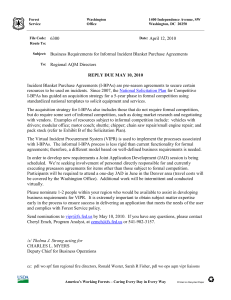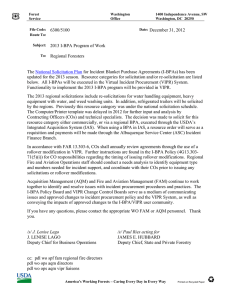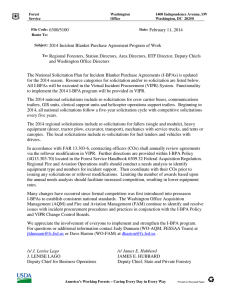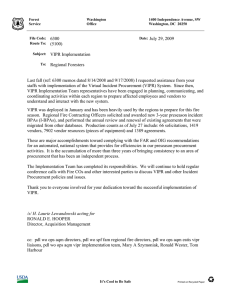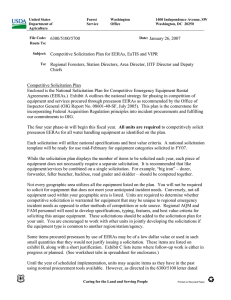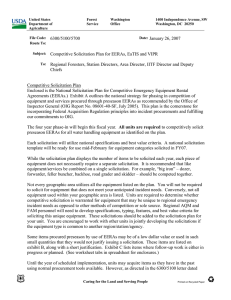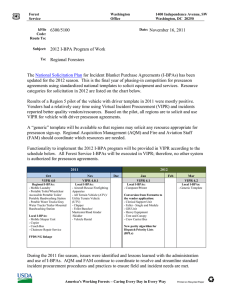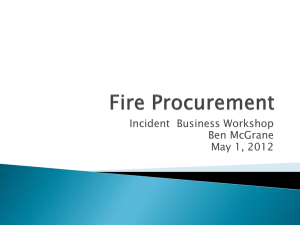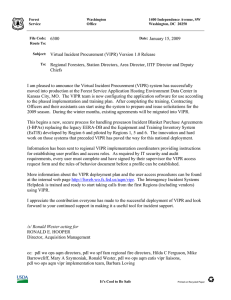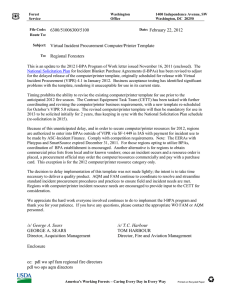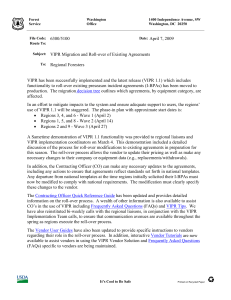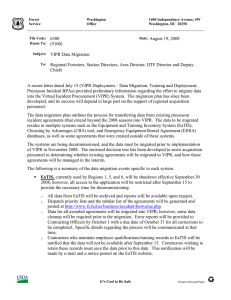6300/5100 October 28, 2010
advertisement
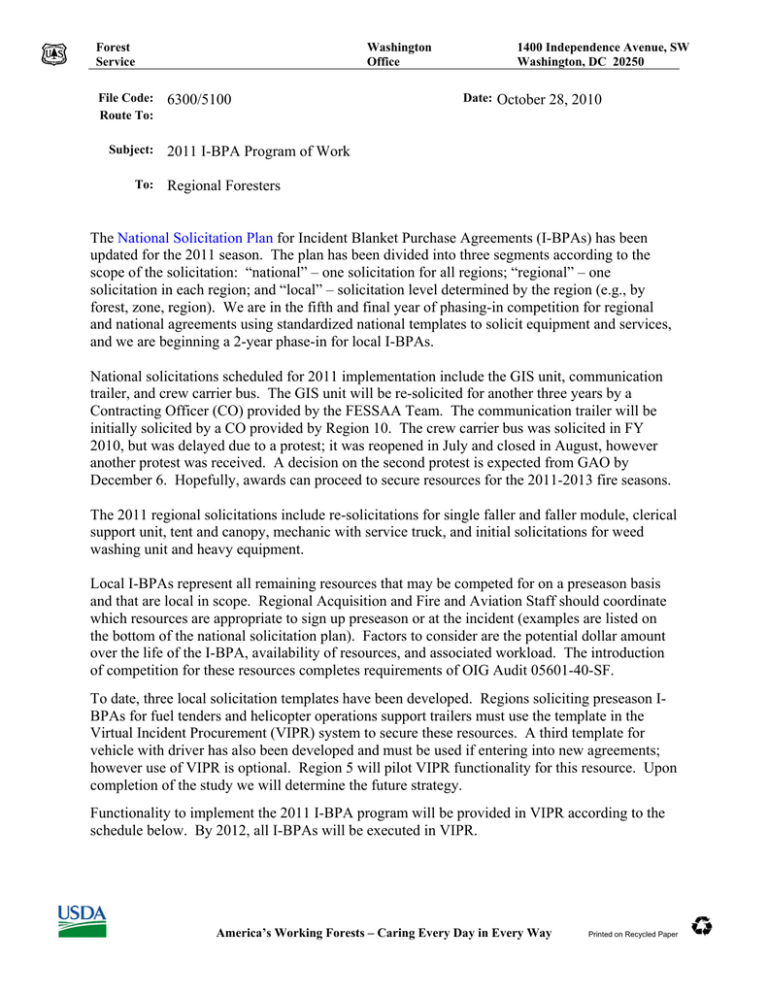
Forest Service File Code: Route To: Subject: To: Washington Office 6300/5100 1400 Independence Avenue, SW Washington, DC 20250 Date: October 28, 2010 2011 I-BPA Program of Work Regional Foresters The National Solicitation Plan for Incident Blanket Purchase Agreements (I-BPAs) has been updated for the 2011 season. The plan has been divided into three segments according to the scope of the solicitation: “national” – one solicitation for all regions; “regional” – one solicitation in each region; and “local” – solicitation level determined by the region (e.g., by forest, zone, region). We are in the fifth and final year of phasing-in competition for regional and national agreements using standardized national templates to solicit equipment and services, and we are beginning a 2-year phase-in for local I-BPAs. National solicitations scheduled for 2011 implementation include the GIS unit, communication trailer, and crew carrier bus. The GIS unit will be re-solicited for another three years by a Contracting Officer (CO) provided by the FESSAA Team. The communication trailer will be initially solicited by a CO provided by Region 10. The crew carrier bus was solicited in FY 2010, but was delayed due to a protest; it was reopened in July and closed in August, however another protest was received. A decision on the second protest is expected from GAO by December 6. Hopefully, awards can proceed to secure resources for the 2011-2013 fire seasons. The 2011 regional solicitations include re-solicitations for single faller and faller module, clerical support unit, tent and canopy, mechanic with service truck, and initial solicitations for weed washing unit and heavy equipment. Local I-BPAs represent all remaining resources that may be competed for on a preseason basis and that are local in scope. Regional Acquisition and Fire and Aviation Staff should coordinate which resources are appropriate to sign up preseason or at the incident (examples are listed on the bottom of the national solicitation plan). Factors to consider are the potential dollar amount over the life of the I-BPA, availability of resources, and associated workload. The introduction of competition for these resources completes requirements of OIG Audit 05601-40-SF. To date, three local solicitation templates have been developed. Regions soliciting preseason IBPAs for fuel tenders and helicopter operations support trailers must use the template in the Virtual Incident Procurement (VIPR) system to secure these resources. A third template for vehicle with driver has also been developed and must be used if entering into new agreements; however use of VIPR is optional. Region 5 will pilot VIPR functionality for this resource. Upon completion of the study we will determine the future strategy. Functionality to implement the 2011 I-BPA program will be provided in VIPR according to the schedule below. By 2012, all I-BPAs will be executed in VIPR. America’s Working Forests – Caring Every Day in Every Way Printed on Recycled Paper Regional Foresters 2 2010 Oct VIPR 3.0 Regional & National I‐BPAs: ‐ Clerical Support Unit ‐ GIS Unit ‐ Heavy Equipment ‐ Single Faller and Faller Module ‐ Tent and Canopy ‐ Weed Washing Unit Nov VIPR 3.1 New Pilot Vendor Application: ‐ Piloted this year as possible replacement for Formatta ‐ Initial release for use with Communication Trailers and Mechanic with Service Trucks Dec Jan VIPR 3.2 Local I‐BPAs: ‐ Fuel tenders ‐ Helicopter Operations Support Trailer ‐ Vehicle with Driver Also uses the pilot vendor application 2011 Feb Mar VIPR 3.3 Rollover Process Changes: Allow vendors to make additional changes to their agreements We are aware that some regional agreements will expire before the 2011 season, but are not scheduled for use in VIPR until 2012. In order to secure resources for 2011, extensions to existing agreements may be needed. If the existing agreement uses OF-294, an extension may be executed on the same form through 2011. However, if a new agreement is needed SF-1449 must be used. Dispatch procedures are critical to the successful implementation of the I-BPA program. The National Interagency Dispatch Standard Operating Guide for Contracted Resources was developed in 2009 to educate dispatchers and incident support personnel in the mobilization & demobilization of contract resources. This guide will be reviewed annually and updated as needed by WO FAM Operations and posted to the National Interagency Coordination Center Web site under “Reference Materials.” Work towards a VIPR/ROSS interface continues. Detailed business requirements will be developed in 2011, with integration scheduled in preparation for the 2013 season. Per Chapter 20 of the Interagency Incident Business Management Handbook (IIBMH), standard rates will no longer be used when contracting for equipment at incident. Rates are to be negotiated by the incident Procurement Unit Leader and/or Contracting Officers based on 90% of the lowest price received during preseason competition. These “90% Reports” are located on the Incident Procurement Web site. As said by Italian author/philosopher Niccolò Machiavelli, “There is nothing more difficult to carry out, nor more doubtful of success, nor more dangerous to handle, than to initiate a new order of things." We have come a long way in the past few years and as it goes with change, there were some lessons learned. We appreciate the hard work everyone involved has done to implement the I-BPA program. If you have any questions, please contact the appropriate WO FAM or AQM personnel. /s/ Ronald R. Wester acting for H. LAURIE LEWANDOWSKI Acting Director, Acquisition Management /s/ T.C. Harbour TOM HARBOUR Director, Fire and Aviation Management cc: pdl wo spf fam regional fire directors, pdl wo ops aqm directors, pdl wo ops aqm vipr liaisons, Ronald Wester, Sarah R Fisher, Tory Henderson
